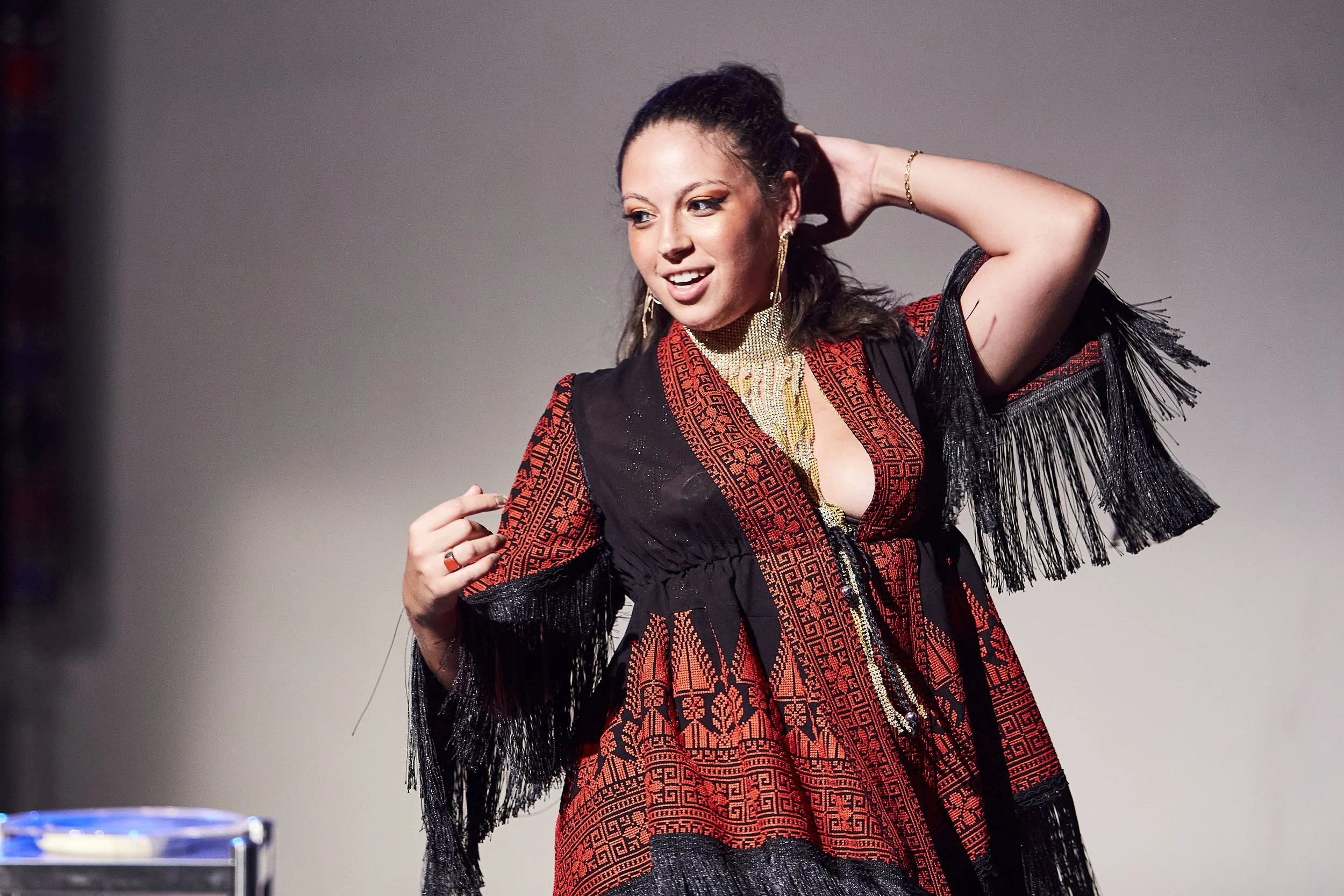All the Body Can Be: Palestinian Queer Resistance in Eat Me Baladi at Cannonball Festival
Courtesy of Chris Koontz
By Sarah Trad
Eat Me Baladi is a multi-chaptered performance piece featuring audiovisual elements, acting, and burlesque. With meticulously curated costumes, soundscape, and choreography, Mette Loulou von Kohl and Leila Delicious explore the ways their bodies as Palestinian femmes become a symbol of resistance in the face of ethnic cleansing. For example, in the opening scene, Delicious strips off her belly dancing regalia to Labrinth’s “Mount Everest;” a song now indistinguishable from the HBO show Euphoria, a controversial remake of an Israeli drama produced by a member of the Israeli Occupation Forces. Leila’s confident ownership of the stage becomes a reclamation of pop culture rarely separated from the destruction of her heritage.
In the second “chapter” we see how the body is a symbol of legacy. Videos of iconic burlesque dancers such as Amalia Aguilar, Blaze Starr, and Sophie Sucre (who dances to James Brown’s “It’s a Man’s World) are interrupted by text that reads “I’m told my Palestinian grandmother wouldn’t approve of me doing burlesque.” The audience learns through text of Leila’s desire for her grandmother to understand the agency that burlesque promotes, especially because her grandmother was the first in her village to not wear a hijab. Leila emerges barefoot in pashmina and kaftan, hilariously embodying her grandmother’s first striptease as she cheekily shows ankle and eats green olives from the jar. Teta’s persona slowly devolves back to Leila who removes her clothes, inspects her skin, and begins a breast check. The lights ominously dim on the character, reminding the audience that the body can also be a source of decay.
Courtesy of Chris Koontz
Chapter Three examines the body as a physical vessel. Video of blood vessels plays with a voiceover of Delicious worrying that her blood is “too diluted to have ownership of her identity.” Her speech concludes that the multiplicity of her background does not “fracture” it. This represents a powerful perspective in the diaspora where the West is obsessed with fractional heritage, 23andMe, and blood quantums imposed on indigenous populations.
Next, we are introduced to von Kohl as an Israeli Prime Minister and capitalist megalomaniac parody character. Loulou attempts to sell the audience a press and defense package using a PowerPoint with her organization’s “Track Record of Accomplishments” which includes the creation of the World Zionist Organization in 1897 and Operation Spring of Youth in 1973. Explaining that this purchase will spin the customer’s choices as exceptional acts of self-defense that will eventually lead to successful domination, Loulou lifts an opaque cake top to reveal her company’s clear jello “Iron Dome.” As elements of her presentation begin to glitch, we see the controlled salesman have a mental breakdown, stripping off the suit to reveal a hooded mesh catsuit. Playing off themes of dominatrix kink culture, Loulou shows the vulnerability of the Iron Dome as she dances around it in stilettos, using her body to destroy it.
As translucent bits of jello litter the floor, the final performance explores the watermelon as a symbol of Palestinian resistance and extension of lesbian pleasure. An informative video explains how the watermelon became a substitute for the Palestinian flag when Israel began arresting Palestinians for exhibiting it. In her last dance, Leila performs burlesque in a robe with tassels and tatreez, Palestinian embroidery that is an iconic testament to women’s art, labor, and community. This final dance is filled with iconography of defiance as Leila centers her body, culture, and pleasure. She places a watermelon between her legs and explores how it can be eaten, physically and metaphorically, before placing it on the rolling cart where the Iron Dome once stood.
Sarah Trad (she/her) is a Lebanese-American artist and curator based in Philadelphia. Working in fibers, video, and computer art, she focuses on themes of how Arab identity intersects with queerness, mental health, memory, and future alternate realities. She is currently the Co-Director of Programming for the MENA Film Festival in Vancouver, as well as a Juror for the Philadelphia Asian American Film Festival and a Community Advisory Board member for the Asian Arts Initiative. Sarah’s work has been screened at the Gimli Film Festival, Toronto Arab Film Festival, Antimatter Media Art Festival, Rendezvous With Madness Festival, Everson Museum of Art, and Currents New Media.




